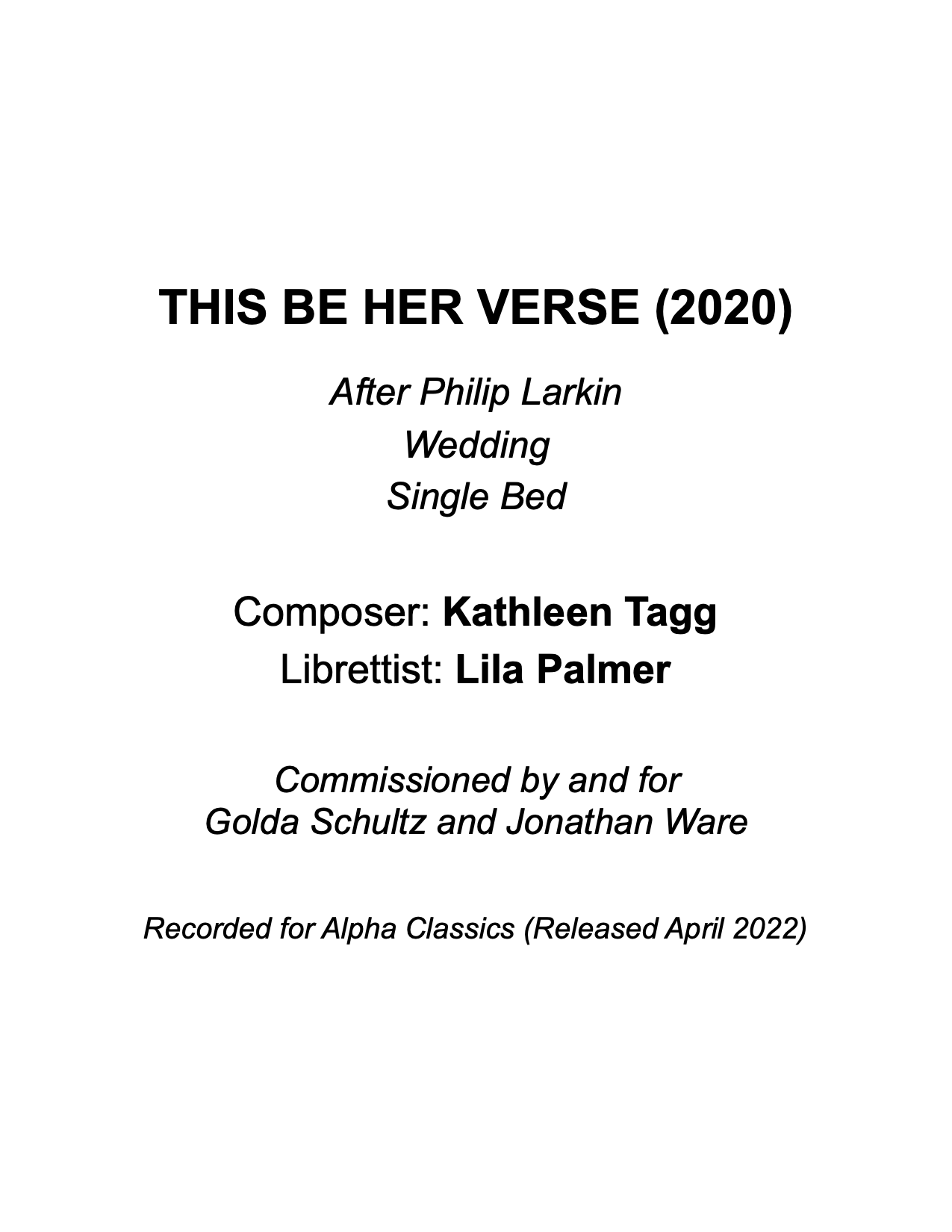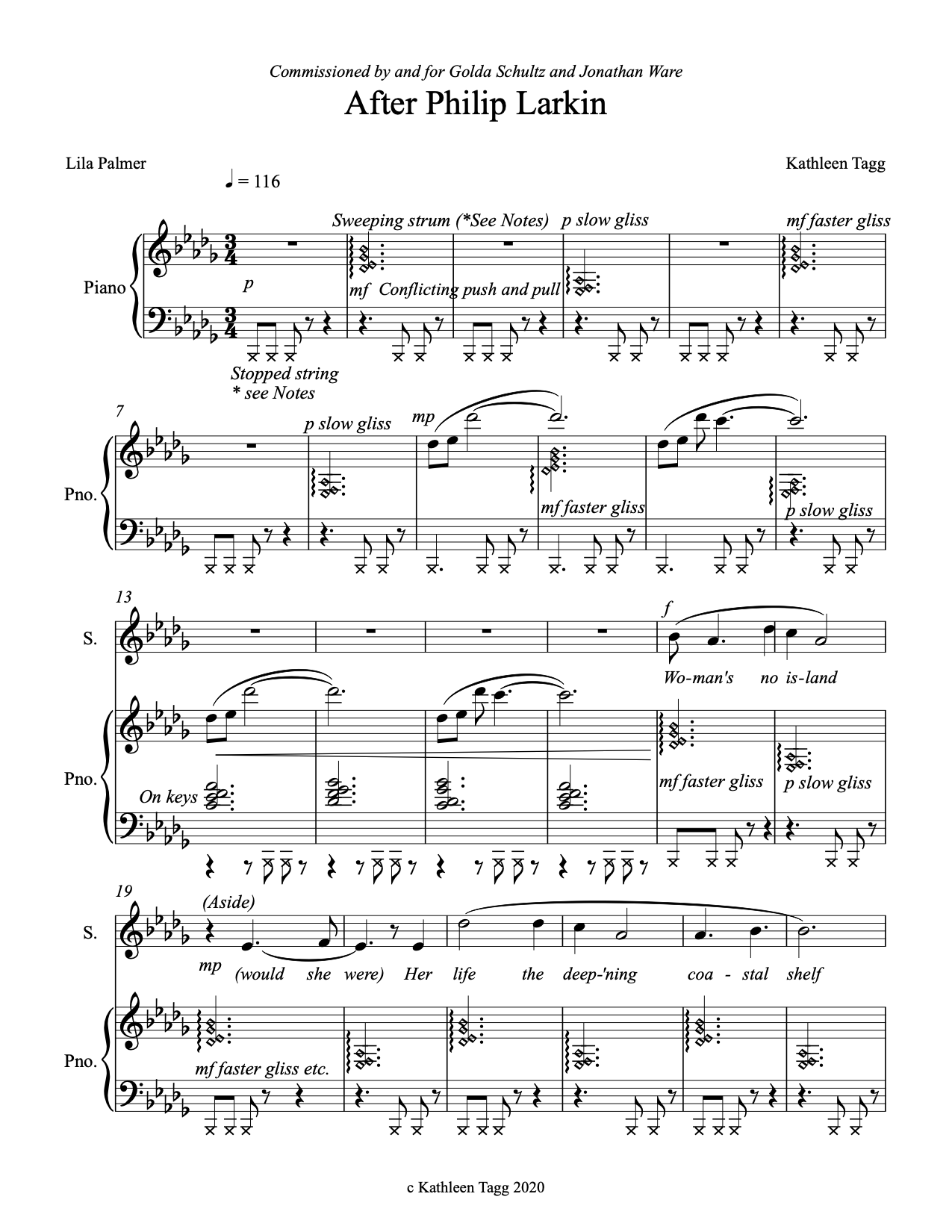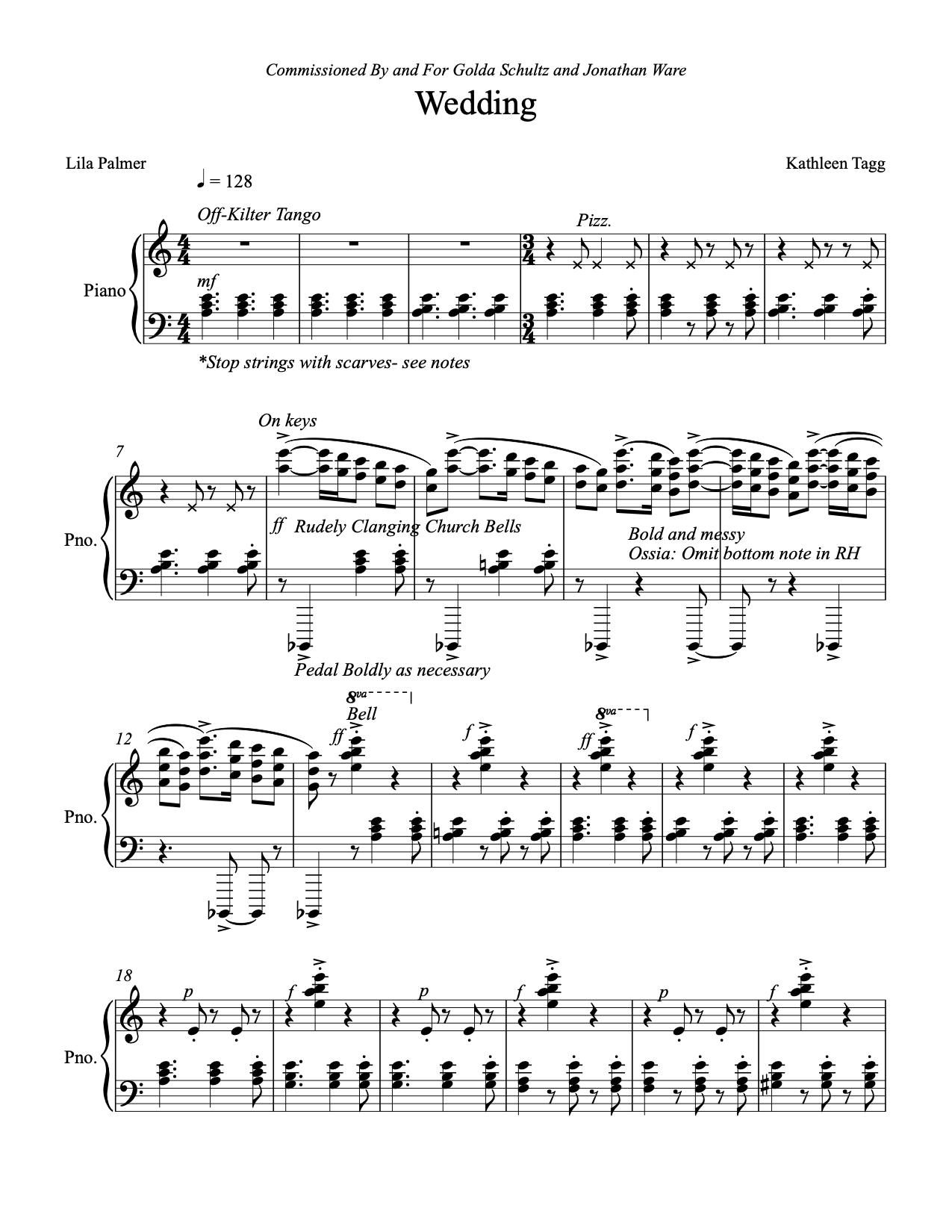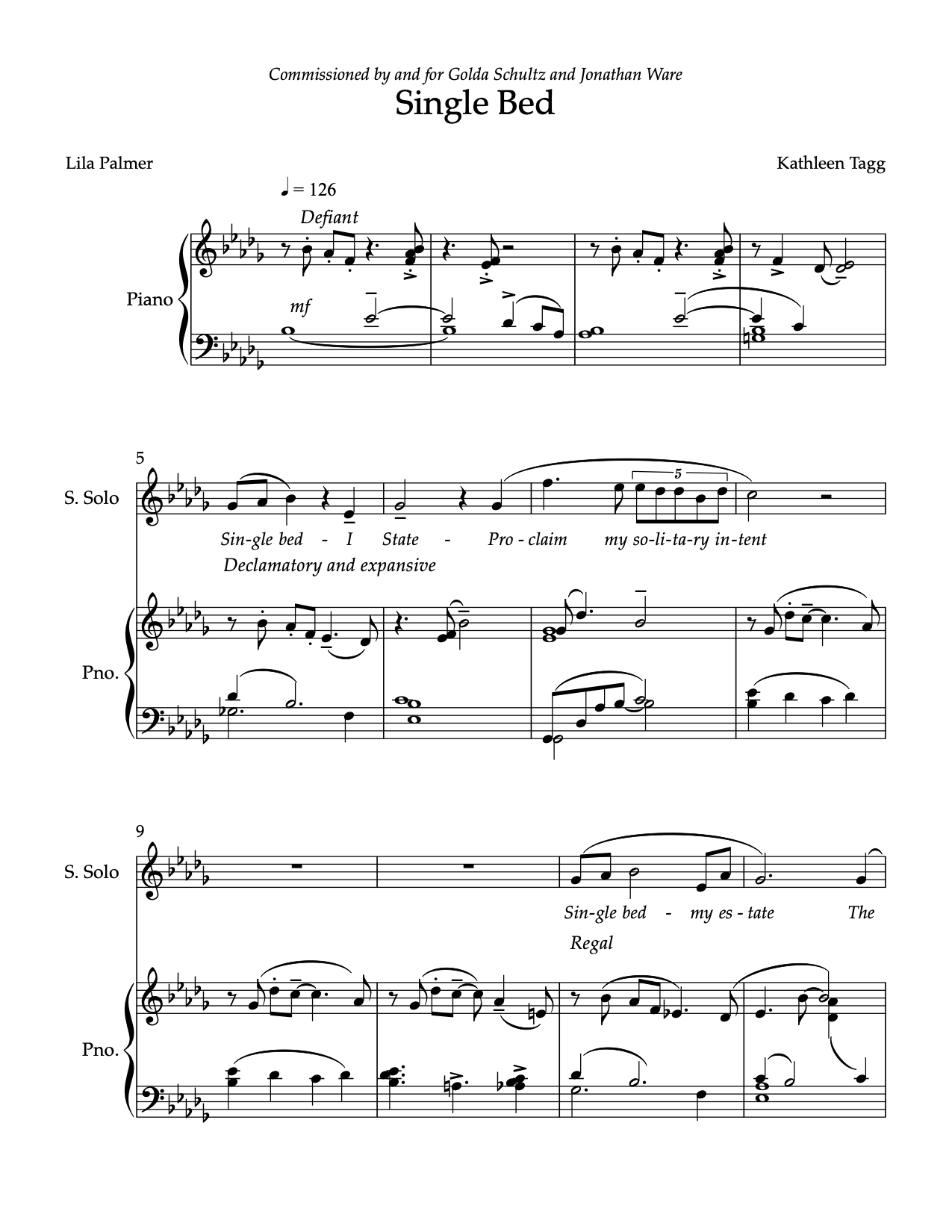This Be Her Verse: 3 Songs for Soprano & Piano (2020)
Composer: Kathleen Tagg . Librettist: Lila Palmer
Songs can be performed together or alone
I. After Philip Larkin ca.3:30
II. Wedding ca.4:00
III.Single Bed ca.5:30
Commissioned by and for Golda Schultz & Jonathan Ware
Duration: ca 13 min
Performances: Lucerne Festival; Edinburgh Festival; Festival D'Aix-en-Provence; National Concert Hall, Dublin; Vancouver Recital Society; Pierre Boulez Saal. Kölner Philharmonie; Cecilia Concerts; San Francisco Performances; Philadelphia Chamber Music Society; DC Vocal Arts; BR Klassik
Recording:
Golda Schultz & Jonathan Ware on Alpha Classics (2022): This Be Her Verse
*CART IN TOP RIGHT CORNER OF THE PAGE*
Program Notes:
A note on the Text of ‘This Be Her Verse’- Lila Palmer, 2022
When Golda first approached me to ask for a song cycle which centered female experience, I felt overwhelmed by the sheer volume of experience absent from the song repertoire. How could I possibly hope to correct women’s erasure from the song tradition in programming and historiography with what could only be a drop in the bucket? And so I began with the personal: stories told by Golda and Kathleen about their experiences and those of the women they knew, and mined my own notebooks for observations and memories gauche, raw and reflective, stretching back from my early twenties to the present. Out of a refining of these experiences came the collection of texts in This Be Her Verse. The title of the cycle reflects and pays homage to the Yorkshire poet Ted Hughes (from my home county), whose poem This Be The Verse my mother hung on our fridge at home. She hung it with a certain wry acceptance of the realities of family life which belied her tenderness and infinite patience that now, as a young mother, I remember with awe. The poems in the set are in some sense modular. They can be sung and understood chronologically over time, in order of composition and in order that one individual might experience the events described in a life, beginning with ‘Single Bed’ and ending with ‘After Philip Larkin,’ or musically, following the journey mapped by the composer.
Women still shoulder a great deal of the burden of both ‘the mental load’ and the physical load of domestic life. Mothers return to work in the U.S. with open wounds in their bodies, and often in their spirits. Maternal mortality is rising again across the world (in areas where it was ever prioritized). Women who seek to define their lives professionally rather than personally still face judgment and censure, as do mothers who do prioritize their health and families over ‘bouncing back.’ Femicide is still endemic across the world. And yet, these horrors are largely not what we talk about when we talk about our experiences, or when we talk to each other. We use humor, warmth and sometimes rage as we talk about the visceral, frightening, frustrating, rich, giddying experience of being female, the embodied physicality of all we experience as transformations in our lives, and how we protect each other, by what we share and what we hide.
This Be Her Verse would not exist without the great song cycle Frauenliebe und Leben, Robert Schumann’s setting of Adelbert von Chamisso’s Woman’s Love and Life. Taking on that hyper-romanticized behemoth reflecting the cookie cutter wife and mother of the German nineteenth century was a significant inspiration for me as it has been for other female creative teams. The poems in This Be Her Verse follow a similar trajectory to those in Frauenliebe:: from single young woman to wife and mother. The crucial difference is in exploring how this takes place against an internal and external contemporary conversation about ‘marrying’ expectations of gender and one’s own desires for family against the massive roadblocks to personal and professional fulfillment these choices can throw up.
In his setting, Schumann cut the crucial final poem of Chamisso’s text, in which the grandmother of Frauenliebe addresses her granddaughter, balancing the violent emotion of a young woman entirely focussed on her husband with resilience tempered by time. The original cycle dedicated to Clara Schumann might have done well to have included that sense of perspective earned by survival. After Robert’s demise Clara did what so many women have had to do: gather themselves and go out to earn a living, patch their hearts til they have time to tend them, raise and care for their children, somehow, against the odds, in a world that is structured to underpay and under-support them. This Be Her Verse is not a pantheon to female perfection, but a mirror to everyday women’s hopes and fears, a mirror to our survival, and a salute to the choices women have made to self realise across time, from the celibate Abbesses commanding villages in the early medieval period, gloriously entombed alone marble celebration; to the mothers alone at home by choice or necessity. It is a celebration of brokenness and beauty. This song cycle has already been termed ‘brutal’ by one critic. Brutal as life often is for women, as brutally (let's be frank) as we judge ourselves and often each other, we go on, loving, serving, working, laughing. In Sharon Krebs’ complete translation of Frauenliebe, the grandmother gives perhaps the most realistic blessing of the entire cycle: ‘If your heart must break/ May your courage remain steadfast.’ May we have the courage to be honest, and be heard.
Composers note: Kathleen Tagg, 2022
This cycle came about as an intensely personal collaboration between the artists who commissioned these songs, (Golda Schultz and Jonathan Ware) and the creators (Lila Palmer and myself). When Golda and Jonathan first approached me and Lila to write these songs, the idea was that it would be to tell our stories- not those of “women’s stories” as told from the outside with the woman victimized or placed on a pedestal- but our stories in our own voices. We began the process by sharing stories deeply personal and mundane, and from there the works were written. Out of the process of collaboration came the decision for these songs to be performed as a flexible cycle, where the performers have freedom to choose the order of the songs based on what resonates with the performers- a choice which may be different from my original intent, but which excites me with its possibilities.
Musically, the texts always shape the vocal line. The piano part alternates between being its own protagonist, commenting on the text, supporting the text, and expanding dramatically on ideas voiced in the text. Given the highly personal nature of this process, the music was specifically written with the sound of these incredible artists in my ear.
The writing for the piano continues an exploration of a personal sound world in which I have been working for the past 15 years, creating orchestral textures with the piano through the use of extended techniques and extremely lightweight preparations using everyday household objects such as scarves and paper. My compositional work has largely been shaped by my work and collaborations as a performing pianist, music director and producer, particularly as a pianist and as a collaborator performing with singers from diverse backgrounds and genres. Storytelling, ideas of connection and sound exploration are what drives my work, and this work provided me with a place to bring together disparate parts of my professional life. I am extremely grateful to these rare artists who not only bring their sublime artistry to their vision of programming what they want to hear in the world, but for then going the extra steps and actively changing the landscape by commissioning both words and music from women artists about our own stories and experiences from our own points of view.
After Philip Larkin:
The piano introduces the sweeping strums of daily life washing over the vocal line on top of a dull, stopped thud of the bass. Predictability and slight deadening countering the sweep of motion, possibility and joy. The main interlude bridges the stanzas, sweeping out of the "ego self" and pushing forward in intensity, leading to a polytonal rude hammering, and a push-and-pull syncopated tug of war, all the way through to a tender intimacy - and back up to a battle of emotions. The final piano postlude starts brash and torn, winding down bit by bit as pieces of the old self- and resistance- crumble and peel off.
Wedding:
Wedding provides a musical snapshot of a pivotal moment. Musically, the setting juxtaposes an off-kilter tango with chaotically clanging church bells in the heat of the square. A single recurring E heartbeat occurs throughout: heart beats tying together the ideas of excited uncertainty, waiting, and the passage of time.
Single Bed:
This is the heart of this group of songs, built around highly personal and intimate storytelling. The music turns on a dime to support the ever-shifting turns of thought of the story teller, with recitative-like declamations becoming reflective or confessional like a theatrical monologue.
Performances:
Golda Schultz & Jonathan Ware:
Pierre Boulez Saal (Berlin) Festival Aix-en-Provence )France); Lucerne Festival (Switzerland); San Francisco Performances (USA); DC Vocal Arts (USA); Philadelphia Chamber Music Society (USA); Edinburgh Festival (Scotland);
VAN Magazine: Interview with soprano Golda Schultz
about the album
“South-African Soprano Golda Schultz is a regular at the Met and at Bayerische Staatsoper. In 2020, she sang at the Last Night of the Proms; this season she made her debut with the New York Philharmonic.
With this career stability, she’s confronting the luxurious challenge of “moving the needle” for women composers and women’s stories. Her first recording, titled “This Be Her Verse” (with pianist Jonathan Ware), features music exclusively by women composers. The album, which will be released on April 8, is an in-depth answer to why it is worth programming music by women.”
Golda Schultz & Jonathan Ware recorded This Be Her Verse for the April 2022 release on Alpha Classics.
The songs can be heard below: TRACKS 16-18



